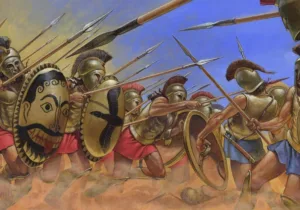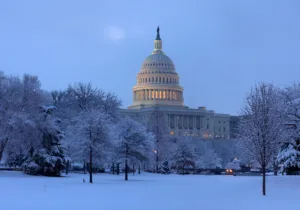Pandemics have historically been catalysts for political, economic, and social change. From Thucydides, Prokopios, and Ibn Khaldun, historians of the past who lived through the great pandemics of their day charted the ghastly toll of these invisible killers. Beyond the shadow of death that continuously loomed among the people, these historians noticed the breakdown of political and social order as nations were unable to cope and as hope among the population began to fade. However, they also noticed the capacity for men and women to take selfless actions to assist their neighbors. It is these two options, to turn against our neighbors or to selflessly serve them, which faces the world today.
In ancient times, as in 2019, the shadow of death that pandemics cast seemingly appeared out of nowhere. Writing in the 400s BC, the Greek historian Thucydides in his History of the Peloponnesian War interrupts his narrative of the great war between Athens and Sparta to recount the appearance of a previously unknown disease: “Although it was said to have broken out in many other places… no one could remember a disease that was so great or so destructive of human life breaking out anywhere before.” Similarly, the Roman historian Prokopios, living in Constantinople in the AD 500s, describes the first recorded instance of the Black Death, which seemed to strike anywhere at will: “It struck some during the summer, others during the winter, and the rest during the other seasons.” In every case, their nations, embroiled in domestic politics and international strife, were unprepared for the silent killer that arrived unexpectedly.
These pandemics were devastating. Describing the Black Death in the AD 1300s, the Arab historian Ibn Khaldun recalls, “It was as if the voice of existence in the world had called out for oblivion and restriction, and the world had responded to its call.” Ibn Khaldun’s home of North Africa was already struggling with dynastic and ethnic conflict as various dynasties fought for power while Arab and Berber tribes clashed for territory. The sudden arrival of the Black Death delegitimized many dynasties and destroyed what little economic profitability remained during the ethnic and dynastic conflict. In his haunting passage describing the plague and its effects upon society he wrote:
This was the situation until, in the middle of the eight [fourteenth] century, civilization in both East and West was visited by a destructive plague which devastated nations and caused populations to vanish. It swallowed up many good things of civilization and wiped them out. It overtook dynasties at the time of their senility, when they had reached the limit of their duration. It lessened their power and curtailed their influence. It weakened their authority. Their situation approached the point of annihilation and dissolution. Civilization decreased with the decrease of mankind. Cities and buildings were laid waste, roads and way signs were obliterated, settlements and mansions became empty, dynasties and tribes became weak. The entire inhabited world changed.
As these unstoppable forces tore through country after country, the historians noted how men and women reacted to the ongoing tragedy. In their accounts, readers can hear tales of triumph and of tragedy, of men and women seeking to take advantage of each other and of neighbors trying to save each other.
On one hand, the discord that Ibn Khaldun noted was observed by Thucydides and Pokopios as well. The collapse of central authority and the physiological effects of fear could fuel the growth of lawlessness. “Confusion began to reign everywhere and in all ways,” as Pokopios notes. “The great lawlessness that grew everywhere in the city began with this disease,” writes Thucydides, “people saw before their eyes such quick reversals that they dared to do freely things they would have hidden before—things they would have never admitted they did for pleasure.”
Yet, despite all the chaos and terror that surrounded them, the ancient historians still witnessed acts of human virtue. Prokopius notes that the notoriously troublesome sport factions, which also had political and social roles, unified in the name of the common good: “At this time also those elements of the populace who had formerly been militants in the circus fan-clubs set aside their mutual hatred and came together to conduct the funeral rites of the dead, carrying in person and burying the bodies of those who did not belong to their color.” Even the typically cynical Thucydides observes that those who “made pretense to virtue” would go to comfort their friends or family despite the risks to themselves. Small acts of defiance against an unseen enemy to help those in need.
This spirit of resistance can be heard in the last speech of the great Athenian statesman Pericles. Tired by years of war with the Spartans and the loss of life due to the plague, the Athenian people turned on Pericles and blamed him for their misfortune. According to Thucydides, Pericles called a meeting of the general assembly and criticized the Athenians: “For my part, I am the man I was. I have not shifted ground. It is you who are changing.” Pericles pointed out that, despite feeling overwhelmed by the sudden change in fortune and the plague that had descended upon them, the Athenian people were still accountable for their actions and accountable to their community. He finished his speech with the following words:
As for you, keep your minds on the fine future you know will be yours and the shame you must avoid at the moment. Be full of zeal on both counts. Send no more heralds to the Spartans, and do not let them know how heavy your troubles are at present. The most powerful of cities and individuals are the ones least sensitive in their minds to calamity and the firmest in their actions to resist it.
In the words of King Solomon, “What has been will be again, what has been done will be done again; there is nothing new under the sun.” Since there is nothing new under the sun, reflecting upon the writings of the ancients can serve as a mirror for our times. While COVID-19 is not nearly as dangerous as the Athenian Plague or the Black Death, its effects on political systems and society should not be underestimated. The same choices previous generations faced remain: Do we attempt to save each other or consume each other? Do we attempt to avoid the shame of the moment or do we allow the moment to overtake us? How nations answer these questions will determine how they emerge into a new and changing world.







 Sponsor a student for Christianity & National Security 2024
Sponsor a student for Christianity & National Security 2024